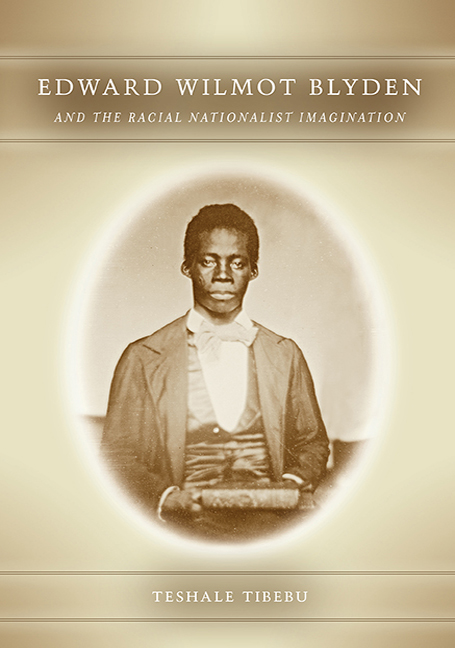Book contents
- Frontmatter
- Dedication
- Contents
- Acknowledgments
- Introduction
- 1 Africa: Service, Suffering, and Subjection
- 2 The Critique of Eurocentrism
- 3 Ishmael in Africa: Black Protestant Islamophilia
- 4 The African American “Civilizing Mission”
- 5 The “Mulatto” Nemesis
- 6 Appraising the Colonial Enterprise
- Epilogue: Post-Blydenian Reflections
- Notes
- Bibliography
- Index
4 - The African American “Civilizing Mission”
Published online by Cambridge University Press: 08 April 2017
- Frontmatter
- Dedication
- Contents
- Acknowledgments
- Introduction
- 1 Africa: Service, Suffering, and Subjection
- 2 The Critique of Eurocentrism
- 3 Ishmael in Africa: Black Protestant Islamophilia
- 4 The African American “Civilizing Mission”
- 5 The “Mulatto” Nemesis
- 6 Appraising the Colonial Enterprise
- Epilogue: Post-Blydenian Reflections
- Notes
- Bibliography
- Index
Summary
Civilisation has its advantages and disadvantages, its privileges and its burdens; the White man's Burden and the Black man's Burden.
—Blyden, West Africa before EuropeBlyden is a modernist. He is an ardent believer in that typical ideology of nineteenth-century liberalism, one he calls “the law of progress.” As he puts it, “There is no such thing as standing still in life. The law is either forward or backward; if there is no conscious movement forward, there is an unconscious movement backward.” Based on such a belief, he sees Africa as a backward continent. He tirelessly advocates the need for Africans to rise above and beyond their material and spiritual degradation. He writes in A Voice from Bleeding Africa on Behalf of Her Exiled Children:
The man who desires to do good in his day and generation; who wishes to keep up with his times, and leave marks behind him of his having lived; must stand hard by the railroad track of Improvement; and when the whistle is sounded for the moving of the train, he must, without delay, jump into first vehicle that presents itself; otherwise, if he stop to argue with others as tardy as himself, on the propriety or impropriety of taking this or that car, he will certainly lose his chance, and the probability is will always be left in the rear by those more prompt and energetic than himself.
He called on black people to jump on the “railroad track of Improvement,” to be counted among the great nations of the world. For this to materialize, he advocated the idea of the diasporic African American civilizing mission of Africa.
Blyden was neither the first nor the last person to hold firm the idea of the African American civilizing mission of Africa. Alexander Crummell, Martin Delany, and even Marcus Garvey, among others, thought that they had the moral responsibility and the racial calling to help uplift Africa out of what they perceived as its entanglement in savagery and barbarism. That way, the black race would find the much needed respectability it so lacked, yet so much desired.
- Type
- Chapter
- Information
- Edward Wilmot Blyden and the Racial Nationalist Imagination , pp. 76 - 107Publisher: Boydell & BrewerPrint publication year: 2012

